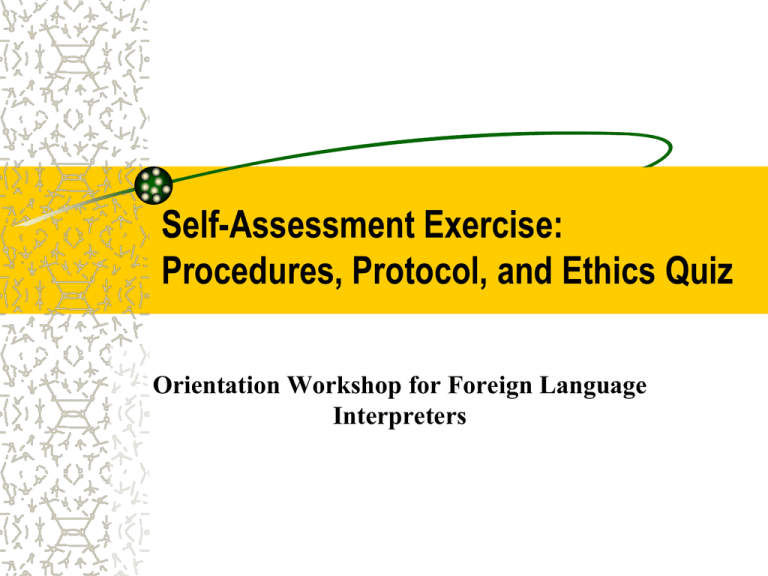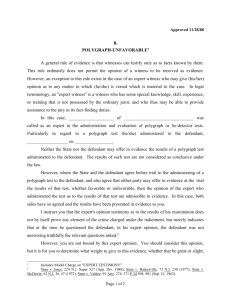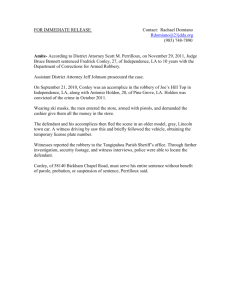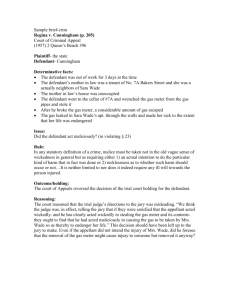Self-Assessment Exercise: Procedures, Protocol, and Ethics Quiz
advertisement

Self-Assessment Exercise: Procedures, Protocol, and Ethics Quiz Orientation Workshop for Foreign Language Interpreters 1. Which of the following skills is LEAST important in interpreting? A. B. C. D. Memory Bilingualism Native accent Intelligence 1. A. B. C. D. Which of the following skills is LEAST important in interpreting? Memory Bilingualism Native accent Intelligence 2. The mandatory method for interpreting at the witness stand is A. Simultaneous B. Consecutive C. Summary D. Paraphrase ? ? ? 2. The mandatory method for interpreting at the witness stand is A.Simultaneous B.Consecutive C.Summary D.Paraphrase 3. A. B. C. D. A source language means A native language An official language used in the courts A dead language from which a modern language is derived A language from which one translates/interprets 3. A. B. C. D. A source language means A native language An official language used in the courts A dead language from which a modern language is derived A language from which one translates/interprets 4. If an attorney is speaking too fast or too softly, the interpreter must A. Continue interpreting the best he/she can so as not to interrupt the proceedings B. Raise his/her hand to get the speaker’s attention C. Immediately inform the court D. Stop interpreting 4. If an attorney is speaking too fast or too softly, the interpreter must A. Continue interpreting the best he/she can so as not to interrupt the proceedings B. Raise his/her hand to get the speaker’s attention C. Immediately inform the court D. Stop interpreting 5. Paraphrase or summary interpretation may be used A. When other interpreting modes are impossible Usually during consultation in chambers At no time In lock-up or jail interviews only B. C. D. 5. A. B. C. D. Paraphrase or summary interpretation may be used When other interpreting modes are impossible Usually during consultation in chambers At no time In lock-up or jail interviews only 6. A. B. C. D. A notepad and pencil shall Always be carried Never be used at the witness stand Only be used during consecutive interpreting Always be kept out of sight 6. A. B. C. D. A notepad and pencil shall Always be carried Never be used at the witness stand Only be used during consecutive interpreting Always be kept out of sight 7. An interpreter may accept payment from a defendant in a criminal case A. When he/she works past 5:00 PM B. Only if he/she wins the case C. Under no circumstances D. If he/she does extra interpreting, such as assisting an attorney to communicate with family members 7. An interpreter may accept payment from a defendant in a criminal case A. When he/she works past 5:00 PM B. Only if he/she wins the case C. Under no circumstances D. If he/she does extra interpreting, such as assisting an attorney to communicate with family members 8. To become familiar with the particulars of a case, the interpreter must A. Take time to personally interview the defendant B. Request and review the case file C. Obtain the points of view of both defense and prosecuting attorneys D. Talk with family members 8. To become familiar with the particulars of a case, the interpreter must A. Take time to personally interview the defendant B. Request and review the case file C. Obtain the points of view of both defense and prosecuting attorneys D. Talk with family members 9. At which proceeding is the defendant informed of the charges against him/her and asked to enter a plea? A. Pre-trial conference B. Probation and sentencing C. Arraignment D. Voir dire ….? 9. At which proceeding is the defendant informed of the charges against him/her and asked to enter a plea? A. Pre-trial conference B. Probation and sentencing C. Arraignment D. Voir dire 10. During a jury trial, the court interpreter is approached by a newspaper reporter who wishes to discuss the case. The interpreter should A. Answer any questions the reporter has B. Refuse to talk to the reporter under any circumstances C. Explain to the reporter that he/she is not allowed to discuss a pending case D. Inform the reporter that there will be fee for interview regarding this case because such work goes beyond that which the interpreter is normally required to do 10. During a jury trial, the court interpreter is approached by a newspaper reporter who wishes to discuss the case. The interpreter should A. Answer any questions the reporter has B. Refuse to talk to the reporter under any circumstances C. Explain to the reporter that he/she is not allowed to discuss a pending case D. Inform the reporter that there will be fee for interview regarding this case because such work goes beyond that which the interpreter is normally required to do 11. ? A court interpreter is interpreting for the defendant on the witness stand. At some point he/she realizes an interpretation error was made earlier in the testimony. The interpreter should A. Immediately inform the court of the error B. Wait until the next break and discuss the problem with the defendant’s attorney C. Wait until the next break and inform the judge of the problem in chambers D. Take no action, but make sure the mistake does not happen again 11. A court interpreter is interpreting for the defendant on the witness stand. At some point he/she realizes an interpretation error was made earlier in the testimony. The interpreter should A. Immediately inform the court of the error B. Wait until the next break and discuss the problem with the defendant’s attorney C. Wait until the next break and inform the judge of the problem in chambers D. Take no action, but make sure the mistake does not happen again 12. A. B. C. D. In a criminal proceeding, which party has the burden of proof? Jury Judge Prosecution Defendant 12. A. B. C. D. In a criminal proceeding, which party has the burden of proof? Jury Judge Prosecution Defendant 13.If a witness uses a term an interpreter is unfamiliar with, the interpreter should A. Make an educated guess based on the context B. Ask the witness what he/she meant and inform the court C. Skip the unknown term and continue interpreting D. Inform the court of the problem and ask permission to consult a dictionary or inquire with the witness 13.If a witness uses a term an interpreter is unfamiliar with, the interpreter should A. Make an educated guess based on the context B. Ask the witness what he/she meant and inform the court C. Skip the unknown term and continue interpreting D. Inform the court of the problem and ask permission to consult a dictionary or inquire with the witness 14. The court interpreter has an obligation to A. Make sure the defendant understands everything that is going on in this trial B. Inform the court if an attorney’s question is likely to be too difficult for the defendant to understand C. Interpret everything just as it is said, without explaining or simplifying D. Explain complex legal concepts to the defendant 14. The court interpreter has an obligation to A. Make sure the defendant understands everything that is going on in this trial B. Inform the court if an attorney’s question is likely to be too difficult for the defendant to understand C. Interpret everything just as it is said, without explaining or simplifying D. Explain complex legal concepts to the defendant 15. When an attorney cites points and authorities, he/she A. Tells the court what precedent decisions it must follow in deciding the case B. Informs the court of the expert witnesses who will be testifying in the case C. Challenges the credibility of prosecution witnesses D. Explains to the defendant the charges that have been filed against him/her 15. When an attorney cites points and authorities, he/she A. Tells the court what precedent decisions it must follow in deciding the case B. Informs the court of the expert witnesses who will be testifying in the case C. Challenges the credibility of prosecution witnesses D. Explains to the defendant the charges that have been filed against him/her 16. If counsel misstates the facts, the interpreter should A. B. C. D. Correct the attorney Tell the judge Interpret the misstatement Tell the defendant 16. If counsel misstates the facts, the interpreter should A. B. C. D. Correct the attorney Tell the judge Interpret the misstatement Tell the defendant 17. If the defendant asks what the consequences are for pleading guilty, the interpreter must A. Answer the question only if he/she knows the answer B. Immediately refer to the Code of Nevada C. Inform the defendant that he/she will find out when the time comes D. Refer the question to the attorney 17. If the defendant asks what the consequences are for pleading guilty, the interpreter must A. Answer the question only if he/she knows the answer B. Immediately refer to the Code of Nevada C. Inform the defendant that he/she will find out when the time comes D. Refer the question to the attorney 18. The interpreter is free to speak with any member of the jury A. When the jury has been impaneled B. When the jury has been dismissed C. Only if the juror questions the interpretation D. When court is not in session A,B,C,D? 18. The interpreter is free to speak with any member of the jury A. When the jury has been impaneled B. When the jury has been dismissed C. Only if the juror questions the interpretation D. When court is not in session 19. A. B. C. D. The interpreter may give legal advice In a limited way, under certain circumstances Never under any circumstances When the defendant explicitly asks for help When the defendant is indigent When, when,when,when? 19. A. B. C. D. The interpreter may give legal advice In a limited way, under certain circumstances Never under any circumstances When the defendant explicitly asks for help When the defendant is indigent 20. Chronic is A. B. C. D. Cocaine Heroin Marijuana PCP 20. Chronic is A. Cocaine B. Heroin C. Marijuana D. PCP 21. A. B. C. D. China White is Cocaine Heroin LSD Opium 21. A. B. C. D. China White is Cocaine Heroin LSD Opium 22. A Nickel is A. A measurement for buying and selling marijuana B. A Peruvian strain of cocaine C. A narcotic informant D. A gag used to quiet unruly prisoners 22. A Nickel is A. A measurement for buying and selling marijuana B. A Peruvian strain of cocaine C. A narcotic informant D. A gag used to quiet unruly prisoners 23. A mule is A. B. A stubborn person who will not confess A person who transports narcotics for others C. A person who suffers the severest penalty for drug violations D. A powerful narcotic with a strong kick or effect 23. A. B. A mule is A stubborn person who will not confess A person who transports narcotics for others C. A person who suffers the severest penalty for drug violations D. A powerful narcotic with a strong kick or effect 24. A. B. C. D. Yaba is Marijuana Cocaine Benzodiazepan Methamphetamine 24. A. B. C. D. Yaba is Marijuana Cocaine Benzodiazepine Methamphetamine 25. A. B. C. D. A defendant who represents himself / herself is designated Improper In camera In loco parentis Pro se 25. A. B. C. D. A defendant who represents himself / herself is designated Improper In camera In loco parentis Pro se 26. Counts in an indictment or information are A. B. C. D. The number of victims in a case The allegations of distinct separate offenses The number of potential witnesses in a matter The counter-charges involved in the case 26. Counts in an indictment or information are A. B. C. D. The number of victims in a case The allegations of distinct separate offenses The number of potential witnesses in a matter The counter-charges involved in the case 27. At a preliminary hearing the judge may not A. B. Dismiss the case Release the defendant if the evidence is insufficient C. Release the defendant if the evidence was illegally obtained D. Determine the guilt or innocence of the defendant 27. At a preliminary hearing the judge may not A. B. Dismiss the case Release the defendant if the evidence is insufficient C. Release the defendant if the evidence was illegally obtained D. Determine the guilt or innocence of the defendant 28. Probable Cause is A. A feasible excuse or reason for committing a crime B. A requisite element of a valid search and seizure or arrest C. A precedent source of case law to support an argument D. A fact, not in evidence, from which another fact, in evidence can be derived 28. Probable Cause is A. A feasible excuse or reason for committing a crime B. A requisite element of a valid search and seizure or arrest C. A precedent source of case law to support an argument D. A fact, not in evidence, from which another fact, in evidence can be derived 29. An adjudication hearing is A. A term used for a settlement hearing between parties B. A term used for an allocation dispute C. A term used for a portion of a juvenile proceeding D. A term for division of property adjudication 29. An adjudication hearing is A. A term used for a settlement hearing between parties B. A term used for an allocation dispute C. A term used for a portion of a juvenile proceeding D. A term for division of property adjudication 30. A voir dire interrogation is made A. To hear and see prosecution witnesses B. Prior to the field sobriety test C. To determine if the witness is lying D. To determine qualifications or competency 30. A voir dire interrogation is made A. To hear and see prosecution witnesses B. Prior to the field sobriety test C. To determine if the witness is lying D. To determine qualifications or competency 31. To impanel a jury is A. B. C. D. To sequester a jury To swear in a jury To choose a jury To disqualify a whole jury 31. To impanel a jury is A. B. C. D. To sequester a jury To swear in a jury To choose a jury To disqualify a whole jury 32. Nolo contendere means A. B. C. D. “I won’t answer” “I will not contest the charges” “I won’t do it again” “I cannot understand (the proceedings)” 32. Nolo contendere means A. B. C. D. “I won’t answer” “I will not contest the charges” “I won’t do it again” “I cannot understand (the proceedings)” 33. A. B. C. D. To impeach a witness is To excuse a witness To badger a witness To discredit a witness To qualify a witness 33. A. B. C. D. To impeach a witness is To excuse a witness To badger a witness To discredit a witness To qualify a witness 34. A. B. C. D. A cursory search is A superficial search A house search An area search A detailed search 34. A. B. C. D. A cursory search is A superficial search A house search An area search A detailed search 35. A. B. C. D. To waive means To prove To relinquish To justify To use 35. A. B. C. D. To waive means To prove To relinquish To justify To use 36. A. B. C. D. A rebuttal is A rebuke A refutation A rebuff A rescission 36. A. B. C. D. A rebuttal is A rebuke A refutation A rebuff A remission 37. A. B. C. D. To remand a defendant is To send back into custody To interrogate To release on certain conditions To strip-search 37. A. B. C. D. To remand a defendant is To send back into custody To interrogate To release on certain conditions To strip-search 38. A. B. C. D. To serve a subpoena means To comply with a subpoena To deliver a subpoena To accept a subpoena To prepare a subpoena for service 38. A. B. C. D. To serve a subpoena means To comply with a subpoena To deliver a subpoena To accept a subpoena To prepare a subpoena for service 39. The defense rests means A. The defense cannot proceed for lack of witnesses B. The defense moves for a brief recess C. The defense has finished presenting its case D. The defense is finished with the cross-examination of the prosecution witnesses 39. The defense rests means A. The defense cannot proceed for lack of witnesses B. The defense moves for a brief recess C. The defense has finished presenting its case D. The defense is finished with the cross-examination of the prosecution witnesses 40. A. B. C. D. To sustain an objection means To uphold an objection To make an objection To suffer an objection To withdraw an objection 40. A. B. C. D. To sustain an objection means To uphold an objection To make an objection To suffer an objection To withdraw an objection 41. If you are sure that the person for whom you are interpreting is lying, you should A. B. C. D. Inform the attorney Interpret what is said Let the judge know Tell the person not to lie 41. If you are sure that the person for whom you are interpreting is lying, you should A. B. C. D. Inform the attorney Interpret what is said Let the judge know Tell the person not to lie 42. An attorney calls her client a “son of a bitch.” The interpreter should A. Clean up the language, since the client may be offended B. Interpret everything using the closest equivalents in the target language C. Report the inappropriate behavior to the judge D. Tell that attorney that it is against your religion to use such language 42. An attorney calls her client a “son of a bitch.” The interpreter should A. Clean up the language, since the client may be offended B. Interpret everything using the closest equivalents in the target language C. Report the inappropriate behavior to the judge D. Tell that attorney that it is against your religion to use such language 43. A hung jury is one that A. B. C. D. Has no alternate jurors Cannot reach a verdict Is missing a juror during deliberations Is dismissed for unethical behavior 43. A hung jury is one that A. B. C. D. Has no alternate jurors Cannot reach a verdict Is missing a juror during deliberations Is dismissed for unethical behavior 44. What is considered the most serious type of crime? A. B. C. D. Misdemeanor Gross misdemeanor Felony Infraction 44. What is considered the most serious type of crime? A. B. C. D. Misdemeanor Gross misdemeanor Felony Infraction 45. Which of the following would be heard in civil court? A. Drunk driving B. Divorce C. Petty theft D. Possession of cocaine 45. Which of the following would be heard in civil court? A. Drunk driving B. Divorce C. Petty theft D. Possession of cocaine






